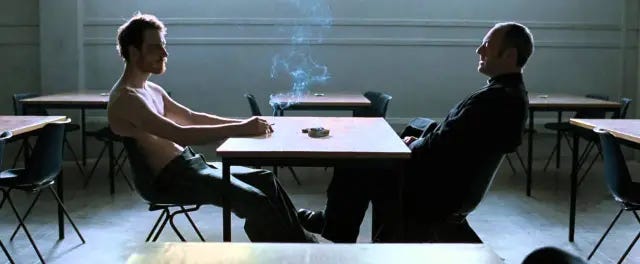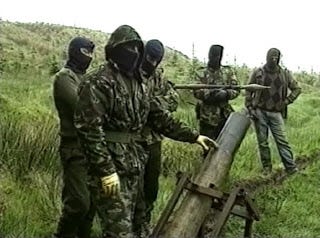“There's a time when the operation of the machine becomes so odious, makes you so sick at heart that you can't take part! You can't even passively take part! And you've got to put your bodies upon the gears and upon the wheels, upon the levers, upon all the apparatus -- and you've got to make it stop!”
-Mario Savio, 1964
Before you read what I’ve written I encourage you to watch the linked YouTube video, a long excerpted scene from the film Hunger (2008).
Hunger (2008) Scene: Bobby Sands Debates the Morality of Hunger Striking
It’s a haunting scene in a haunting film and it touches something deep inside me.
Hunger (2008) is a cinematic Steve McQueen (12 Years a Slave, Shame) debut about the hunger strike that imprisoned IRA members initiated in the Maze Prison (in Northern Ireland) in 1981 which would claim 9 other prisoners’ lives. The protagonist is Bobby Sands (outstandingly played by Michael Fassbender) a community organizer who was arrested as he fled from a robbery and bombing of a Northern Irish furniture store.
Tom, the priest, argues against the destructive path which Sands has chosen. The IRA men in HM Prison Maze prison had been on a no-wash, ‘blanket’ protest for three years by this point in the narrative. They refused to use the prison showers or cut their hair or use the lavatories or wash themselves or wear prison clothing. +100 men crouched, naked, in their fetid cells collecting their excreta to use against prison officials, for years. Every few months the men would be dragged out in pairs and beaten into submission and roughly shorn and scrubbed and placed back into their newly cleaned cells (which had to be sanitized by prison employees in hazmat suits), and the cycle would begin again.
These were not men who lacked resolve.
Tom alludes to these conditions and tries to reason with Bobby, pleading with him and telling him (correctly, we must imagine) that after so long in hellish conditions, using their very bodies to create friction in the prison and state machinery, they’re “in no state to make this call.” He remonstrates and tries to use Bobby’s young son and the future and the needs of Irish communities for leaders and organizers to convince him to turn away.
My feeling about this conversation, and the ideas therein, have only deepened as I have grown older. I must say that I find the priest’s reasoning compelling. I believe he is, ultimately, correct according to utilitarian and deontological ethical reasoning. Bobby is sacrificing his own life based upon a misplaced sense of ideological duty and a hatred of his enemy. It’s a proud refusal to be captive and impotent but in this case his pride causes his own death and contributes to many more…
…HOWEVER, although a human life can have immense value, and an early death can spread waves of suffering outward through society and downward through the generations, death is ultimately the kindling for great political change and human progress. Just as all life feeds on death, all political movements require their sacrificial bodies to be interred in the foundations. Would that it were not so but differences of value and priority and vision require conflict and conflict rewards the side perfectly willing to lose its own men and kill many enemies. Any nation or movement or ideology peopled by men not willing to kill and die will ultimately prove ineffectual and be overwhelmed.
There are limited exceptions in the nonviolent movements that have emerged as tactical possibilities only within the past century. They require a willingness to die in many cases but they neither require death nor killing (although some death can certainly help mobilize sympathy and speeds things up). These can only exist in the context of a very well-developed society in which the moral sensibility of a great mass of citizens can be directed away from injustice and toward benevolence, where social guilt and mercy and compassion are the norm. This requires (1) a citizenry whose consciences can be affected in this way and (2) a government sensitive or responsible to popular will. In other words it requires education and civil development and some degree of democracy. In those countries the movement might not require killing but the existence of the country certainly does. Most societies are born in violence (to some extent) and many only exist now because of some capacity and advertised will to use violence against criminals and invaders and terrorists. Even in those parts of the world swayed by nonviolent movement the state only persists through the use and threat of violence. It is the ultimate linchpin for all our institutions and prosperity and our peace, as strange as that may sounds.
The state is a “human community that (successfully) claims [a] monopoly of the legitimate use of physical force within a given territory.”
-Max Weber
Men like Bobby Sands aren’t police or uniformed soldiers or militia. Truthfully he belonged to a sort of insurgency/terrorist organization. Groups like his are always devoted to (radically) changing the status quo rather than protecting it.
Looking back upon his life and his death we can see that Northern Ireland never joined the 26 counties of the Irish Republic and so Bobby’s central political goal wasn’t achieved. We can also understand that for years after Sands’ death there was interethnic violence and terrorism and insurgency and it ultimately accomplished nothing other than the ruination of many thousands of lives and families. In that case the open wound of violent reprisals was only staunched with peace conferences and political negotiation (another new and novel developments of the past century or so), and a great deal of personal change, and forgiveness. We can feel awe in contemplating Sands’ iron will while recognizing that he deprived himself of a great deal of life in furtherance of a bloody illusion.
Sands’ sacrifice didn’t contribute to the accomplishment of its ultimate aim but it did promote a great deal of change, rippling outward in a dozen directions. He was elected to the Northern Ireland parliament (as he lay dying on a prison cot) and he mobilized a great deal of energy and dedication in younger IRA members. He’s honored with statues and speeches even to this day. His funeral drew a crowd of more than 100,000 people. Is any of this worth a life? How can we say no and then send our own young men men to die for 1/1000th of that gain or promise?
Bobby Sands threw his life away on a lost cause and died horribly with 9 others… YET resolve and aggression like his is ultimately responsible for the shape of the modern world, including the almost miraculous degree of peace and safety we enjoy today.
“People sleep peacefully in their beds only because rough men stand ready to do violence on their behalf.”
-George Orwell
Can we appreciate the men who have died for us (impulsively and violently) while judging Sands’ decision? I’m not sure we can. Sands was a brilliant young man. Aside from being a political terrorist he was a gifted organizer and writer who was elected leader of the IRA men in HM Prison Maze. He was certainly smarter and more reflective and more informed than most fighters throughout history. He also chose the time and manner of his death and resisted the temptation of daily plates of delicious food, brought in and placed next to his bed while his body slowly devoured itself. Is his death glorious or absurd? Perhaps both?
Ultimately we must set the paradox aside: a life is a terrible thing to waste and is almost never individually worth the small gains in whichever battle or movement is being contested… yet without those deaths our comfort and our freedom would be enveloped and extinguished very quickly. Bobby Sands was tragically misled by his beliefs and yet he is archetypical of the patriots to whom we owe everything. As someone who spent some time in a war which ultimately didn’t accomplish its ends-a war which was visibly saturated with waste and indecision and fought among the most tragic patches of ground on Earth-it’s a quandary especially meaningful to me. I find myself going around and around, like a hurried man on Penrose steps.
I simply don’t know.







